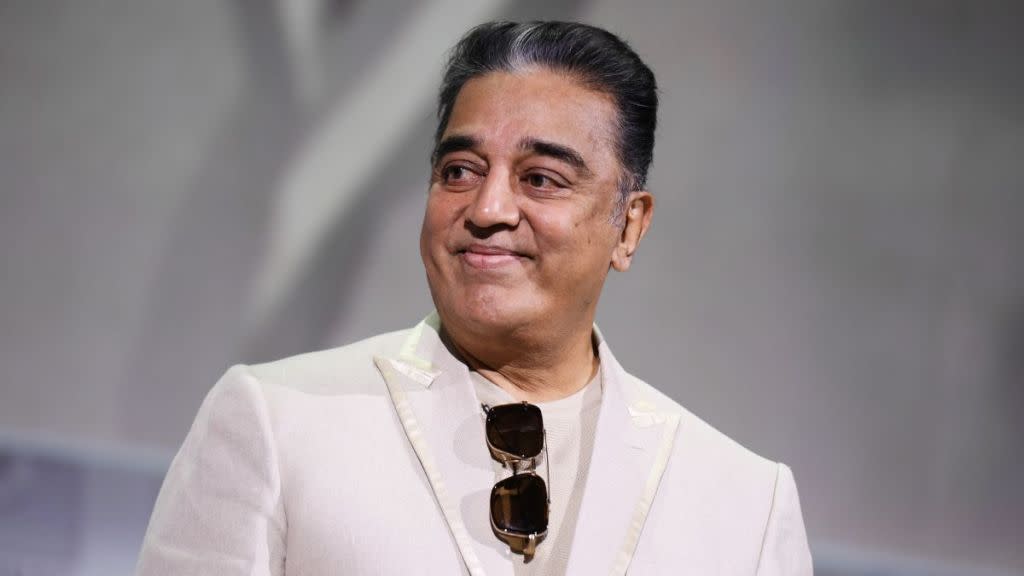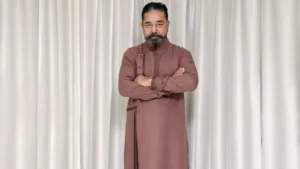Kamal Haasan’s Linguistic Remark Sparks Outrage in Karnataka: A Deeper Look at the Controversy!

Veteran actor, filmmaker, and politician Kamal Haasan recently found himself at the center of a linguistic and political storm after making a controversial comment during a promotional event for his upcoming film Thug Life in Chennai. In his address, Haasan stated that the Kannada language was “born out of Tamil,” a claim that immediately sparked backlash across Karnataka, prompting criticism from political figures, pro-Kannada activists, and citizens alike.
The remark has triggered a larger conversation on language, identity, and cultural pride in India—a country where linguistic diversity is both a strength and a sensitive issue.
The Remark That Sparked the Fire
Kamal Haasan’s statement came during the launch of Thug Life, a film directed by Mani Ratnam, where Kannada actor Shivarajkumar was also in attendance. Haasan, known for his eloquence and love for Tamil culture, began his speech by stating: “Uyire Urave Tamizhe” (“My life and my family is Tamil”). He then turned to Shivarajkumar and said, “Your language (Kannada) was born out of Tamil, so you too are included.”
While Haasan likely intended to express a sense of cultural and linguistic kinship, his statement was interpreted by many Kannadigas as diminishing the status of the Kannada language and undermining its historical and literary significance.
Backlash in Karnataka
The backlash was swift and intense. Prominent political figures in Karnataka condemned the remark, with Bharatiya Janata Party (BJP) state president B.Y. Vijayendra calling the statement “uncultured and unacceptable.” Vijayendra accused Haasan of attempting to glorify Tamil culture at the expense of Kannada and demanded a public apology. He stated, “It is extremely condemnable that Kamal Haasan insulted the Kannada language, which has a history of over 2,000 years, and hurt the sentiments of 6.5 crore Kannadigas.”
Pro-Kannada groups also reacted strongly. Posters of Thug Life were torn down in parts of Bengaluru, and some activists have called for a boycott of Kamal Haasan’s films. Social media erupted with criticism, with hashtags like #KamalHaasanApologize and #RespectKannada trending among Kannada users on X (formerly Twitter).
The issue has resonated deeply in Karnataka, where linguistic pride is closely tied to identity, heritage, and autonomy. Kannada, a classical language recognized by the Indian government, boasts a rich literary history that predates many modern Indian languages. To suggest that Kannada is derived from Tamil is, for many, an affront to this legacy.

Linguistic History and the Dravidian Connection
While Kamal Haasan’s comments may have been rooted in a shared Dravidian linguistic ancestry, his phrasing oversimplified a complex historical relationship. Linguists agree that Tamil and Kannada are both part of the Dravidian language family, which includes Telugu, Malayalam, and others. However, Kannada and Tamil are sister languages—not mother and child. They developed independently over centuries, with Kannada inscriptions dating back to at least the 5th century CE.
Historians and scholars note that while there may have been mutual influence between Tamil and Kannada, suggesting a linear origin of Kannada from Tamil is inaccurate and ignores the autonomous development of both languages.
Kamal Haasan’s Track Record with Cultural Commentary
Kamal Haasan is no stranger to controversy. Known for his intellectualism and outspoken views, he often comments on social, political, and cultural issues. As the founder of the political party Makkal Needhi Maiam (MNM), Haasan has positioned himself as a progressive voice advocating for rationalism and regional pride—especially Tamil identity.
His deep association with Tamil culture is well known, and he frequently emphasizes the antiquity and richness of the Tamil language. However, critics argue that this fervent Tamil pride can occasionally veer into cultural chauvinism when not tempered with inclusivity and nuance.
In this instance, many feel Haasan’s comments—whether intentional or not—overstepped, disregarding the sensitivities of neighboring linguistic communities.
Why the Reaction Matters
The intense reaction to Haasan’s statement highlights the deep-rooted importance of language in India’s socio-political fabric. Language is not merely a means of communication; it is a marker of identity, pride, and self-determination. In states like Karnataka, where linguistic pride is institutionalized through policies like mandatory Kannada signage and local language promotion, any perceived slight is taken very seriously.
This controversy also touches on broader themes: inter-state cultural dynamics, the politics of representation, and the balance between pan-Indian unity and regional diversity.
At a time when India continues to grapple with debates over the imposition of Hindi and the marginalization of regional languages, Haasan’s remark has been interpreted by many as part of a larger pattern of undermining local identities. In this climate, even a seemingly casual comment can ignite passions and provoke widespread dissent.
The Silence and the Fallout
As of now, Kamal Haasan has not issued an apology or clarification regarding his statement. His silence has only intensified calls for accountability, with critics arguing that as a public figure—especially one engaged in politics—he should be more aware of the impact of his words.
In the entertainment industry, the controversy could have economic implications. Karnataka is a significant market for South Indian cinema, and alienating Kannada-speaking audiences could hurt box office collections for Thug Life and future projects involving Haasan.
Some voices in the film fraternity have called for de-escalation, urging people to view the statement in context and assume positive intent. However, without a public clarification from Haasan, the controversy is unlikely to subside soon.
Moving Forward: A Call for Cultural Sensitivity
This episode serves as a reminder of the need for cultural sensitivity in a diverse nation like India. While celebrating one’s heritage is important, doing so without diminishing others is essential. India’s linguistic mosaic is delicate, and respecting its diversity requires thoughtful and inclusive rhetoric—especially from influential personalities.
If Kamal Haasan chooses to address the issue, a sincere acknowledgement of the importance of Kannada and a respectful clarification could go a long way in mending ties and reaffirming the values of unity in diversity.
In the end, the controversy is not just about one actor or one remark. It reflects the ongoing negotiation between regional identities and national narratives—an ever-evolving dynamic that demands empathy, awareness, and a commitment to mutual respect.











